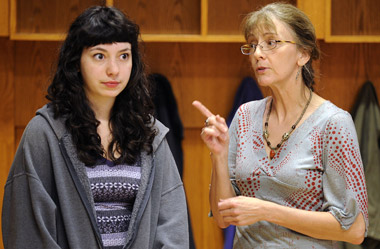Circle Mirror Transformation is the name of a theater game in which a sound and motion begun by one participant is mirrored by the whole group, then transformed by someone else into another movement, and so on around the circle. It’s also the title of the play that opens New Century Theatre’s summer season, and a clue to the show’s arc.
The playwright, Annie Baker, grew up in Amherst in the 1980s and ’90s. Her hometown experiences and the intricate exchanges that comprise what she has called “that strange little world” of small-town New England life are reflected in a trilogy of plays set in a fictional Vermont town that mirrors Amherst. These include the Obie-winning Circle Mirror Transformation, which draws on the acting classes Baker took as a teenager at the Bangs Community Center. She’s been hailed as the fresh, smart face of “new naturalism,” rooted in Chekhov and often compared to both Pinter, for her eloquent silences, and Mamet, for her super-realistic dialogue (the pauses and the ers and ums are all precisely calibrated in her scripts).
Circle Mirror begins with a fairly long silence, finally broken by hesitant counting, one person at a time: “One… two… three… .” It’s part of another ensemble-building theater game, aimed at creating a kind of “group brain” that works together instead of colliding. In the course of the play’s 30 short scenes, four first-time actors and their novice teacher circle, collide, reflect each other’s strengths and fears, and are ultimately transformed.
The play is set entirely in the local community center’s small dance studio, with a mirrored wall and a floor inlaid with a circular medallion of polished wood (kudos to designers Shawn Hill and Amy Putnam for the set’s elegant simplicity). It unfolds during a six-week Creative Drama course led by the center’s director, Marty (Sara Whitcomb). Most of the students have enrolled for non-theatrical reasons: 50ish Schultz (Frank Aronson) and 30-something Theresa (Sandra Blaney) seeking solace and healing in the wake of failed relationships; Marty’s husband James (Keith Langsdale), presumably on hand to fill out the numbers. Only teenage Lauren (Maya Rivera) is there because she wants to learn to act.
In the course of the weekly sessions, a marriage will steer toward the rocks, a new flame will flare and sputter, the theater games will veer into psychodrama, and the windowless studio will become a crucible of surprised emotions and self-discoveries. The play’s attraction derives from its shrewd framing device, the awkward, funny and ultimately revealing group exercises (the theater game of the title is actually improvised at every performance). Baker’s keen ear for everyday speech makes the characters’ interactions real and immediate, but their very artlessness tends to undermine the play’s more conventional dramatic devices and plot twists.
This production’s attraction lies equally with its performers. All five, under Ellen W. Kaplan’s understated direction, deliver convincingly “unactorly” performances, transparently realistic, detailed, funny and touching. Aronson, Blaney, Langsdale and Whitcomb are all New Century veterans, and in their company Rivera—who, like the playwright before her, has just graduated from Amherst High—more than holds her own among the old pros.
Through June 24, New Century Theatre, Mendenhall Performing Arts Center, Smith College, Northampton, (413) 585-3220, newcenturytheatre.org.
Contact Chris Rohmann at StageStruck@crocker.com.



